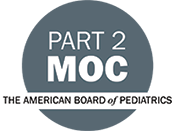Opioid Issues in Youth Pain Management for Orthopedic Injuries
|
CME Certificate Fee: $25.00 (USD) for certificate
Optional Maintenance of Certification Credit (MOC) Fee: $10.00 (USD) per point
|
 |
|
1.00 AMA PRA Category 1 Credit(s)TM
1.00 Part II MOC points are available for these specialty board(s):
American Board of Pediatrics
- Credit Type: Lifelong Learning & Self-Assessment
- Practice Areas: Adolescent Medicine
Estimated time to complete this activity: 1.00 hours
|
 |
Author(s)/Editor(s): Mohammad Mortazavi,MD
DISCLOSURE STATEMENT: All author(s), contributor(s), editor(s), and CME Office Reviewer(s) state that they do not have any financial arrangements with ineligible companies (commercial interests) that could constitute a conflict of interest.
Further Author/Editor Information | Further CME Information |
 |
| Meets Special CME Requirements in: Alabama, Alaska, Arizona, Arkansas, California, Colorado, Connecticut, Delaware, District of Columbia, Florida, Georgia, Guam, Hawaii, Idaho, Illinois, Indiana, Iowa, Kansas, Maine, Maryland, Massachusetts, Michigan, Minnesota, Mississippi, Missouri, Montana, Nebraska, Nevada, New Hampshire, New Jersey, New Mexico, New York, North Carolina, North Dakota, Oklahoma, Oregon, Pennsylvania, Puerto Rico, Rhode Island, South Carolina, South Dakota, Tennessee, Texas, U.S. Virgin Islands, Utah, Vermont, Virginia, Washington, West Virginia, Wisconsin, Wyoming Learn More >> New York Licensees: This course will NOT meet the NY pain management/palliative care/addiction requirement for prescribers. |
 |
| Meets the DEA Medication Access and Training Expansion (MATE) requirement. |
 |
Outcome Objectives:
As a result of completing this activity, the participant will be better able to:
- Manage adolescent non-cancer pain using non-opioid therapies.
- Cite at least two key safe opioid prescribing practices from state or CDC guidelines.
- Review trends in opioid overdose and misuse among U.S. adolescents over the last twenty years.
Learning Format: Case-based, interactive online course, including mandatory assessment questions (number of questions varies by course or module). Please also read the Technical Requirements.
|
 |
|
 |
CME Provider: University of Arizona College of Medicine - Tucson
Credit Designation and Accreditation Statements >> |
 |
| Current CME Approval Period:
June 25, 2023 - June 24, 2026
|
 |
| Original Release Date: June 25, 2018 |
 |
| Most Recent Review by Author: June 25, 2020 |
 |
| Most Recent Review by CME Provider: June 25, 2023 |
 |
| Financial Support Received: Supported by a grant from the Arizona Governor's Office for Youth, Faith, and Families (ADHS14-067194:1) |
 |
Opioid Issues in Youth Pain Management for Orthopedic Injuries
| 1.00 AMA PRA Category 1 Credit(s)TM
1.00 Part II MOC points are available for these specialty board(s) (Optional):
American Board of Pediatrics
- Credit Type: Lifelong Learning & Self-Assessment
- Practice Areas: Adolescent Medicine
|
 |
| Current CME Approval Period:
June 25, 2023 - June 24, 2026
|
 |
| Financial Support Received: Supported by a grant from the Arizona Governor's Office for Youth, Faith, and Families (ADHS14-067194:1) |
 |
|
ACCME/AMA PRA Accreditation Statement
The University of Arizona College of Medicine - Tucson is accredited by the Accreditation Council for Continuing Medical Education to provide continuing medical education for physicians.
The University of Arizona College of Medicine - Tucson designates this enduring material for a maximum of 1.00 AMA PRA Category 1 Credit(s)TM. Physicians should claim only the credit commensurate with the extent of their participation in the activity.
Relevant Financial Relationships Statement
University of Arizona Continuing Medical Education adheres to the ACCME's Standards for Integrity and Independence in Accredited Continuing Education. Any individuals in a position to control the content of a CME activity, including faculty, planners, reviewers or others, are required to disclose all financial relationships with ineligible entities (commercial interests). The CME office reviewers have nothing to disclose. All relevant financial relationships have been mitigated prior to the commencement of the activity.
All individuals in a position to control the content of this CME activity have disclosed that they have no relevant financial relationships with ineligible companies that would constitute a conflict of interest concerning this CME activity.
CME Office Contact Information
The University of Arizona College of Medicine - Tucson
Office of Continuing Medical Education
520-626-7832
uofacme@arizona.edu
Robert Amend, M.Ed.
Randa Kutob, MD
|
 |
MOC Recognition Statement(s)
 Successful completion of this CME activity, which includes participation in the activity and individual assessment of and feedback to the learner, enables the learner to earn up to 1.00 MOC points in the American Board of Pediatrics’ (ABP) Maintenance of Certification (MOC) program. It is the CME activity provider’s responsibility to submit learner completion information to ACCME for the purpose of granting ABP MOC credit. Successful completion of this CME activity, which includes participation in the activity and individual assessment of and feedback to the learner, enables the learner to earn up to 1.00 MOC points in the American Board of Pediatrics’ (ABP) Maintenance of Certification (MOC) program. It is the CME activity provider’s responsibility to submit learner completion information to ACCME for the purpose of granting ABP MOC credit.
If you elect to receive MOC credit for this course, you give permission for VLH.com to share your information and activity completion data with the ACCME and the specialty board(s) chosen through the ACCME's Program and Activity Reporting System (PARS).
|
 |
Opioid Issues in Youth Pain Management for Orthopedic Injuries
|
About the Author
 |
Mohammad Mortazavi, MD
Dr. Mortazavi is a dual board-certified pediatric sports medicine physician who founded the first dedicated pediatric sports medicine program in Tucson (Sports Medicine, Rehabilitation, and Concussion Center, aka, SPARCC). Dr. Mortazavi received his medical degree from the University of California at Davis, where he also completed his pediatrics residency. He then earned a fellowship in pediatric sports medicine at Children's Hospital Colorado in Denver. Dr. Mortazavi's practice includes exercise prescriptions for athletes with chronic illness, sports nutrition, and injury-prevention programs.
Disclosure: Dr. Mortazavi states that he does not have any financial arrangements that could constitute a conflict of interest. |
About the Reviewers/Editors
 |
Daniel Derksen, MD
Dr. Derksen is the Walter H. Pearce Endowed Chair and Director of the University of Arizona (UA) Center for Rural Health (AzCRH). He is also Professor in the Public Health Policy and Management Program at UA's Mel and Enid Zuckerman College of Public Health. As AzCRH Director, he oversees the State Office of Rural Health (AzSORH), the Rural Hospital Flexibility Program (AzFlex), the Small Rural Hospital Improvement Program (AzSHIP), and the AzCRH Navigator Consortium.
Disclosure: Dr. Derksen states that he does not have any financial arrangements that could constitute a conflict of interest. |
 |
Randa Kutob, MD
Dr. Kutob is an Associate Professor of Family and Community Medicine at the University of Arizona College of Medicine-Tucson and Director of the Office of Continuing Medical Education. She is a board-certified Family Medicine physician and Diplomate of the American Board of Obesity Medicine with extensive teaching, clinical work, and research in the arena of cross-cultural care and chronic disease prevention and treatment.
Disclosure: Dr. Kutob states that she does not have any financial arrangements that could constitute a conflict of interest. |
|
Opioid Issues in Youth Pain Management for Orthopedic Injuries
Opioid Issues in Youth Pain Management for Orthopedic Injuries
|
Technical Requirements
This web-based activity is offered online and requires an always-on connection to the Internet (the activity cannot be downloaded). The activity works on PC or Mac computers and most tablet computers. The activity should work with the newer versions of major Internet browsers, including Edge, Chrome, Safari, and Firefox. JavaScript should be enabled in all browsers, and Popups and first party cookies need to be accepted from www.VLH.com. You should also have the latest, free  Adobe Reader installed for reading Adobe Reader installed for reading  documents. documents. For additional information, read the Technical Assistance FAQ.

|
 |










 Home | Feedback | Privacy Policy | E-mail Policy | Refund Policy | Terms of Use | Contact
Home | Feedback | Privacy Policy | E-mail Policy | Refund Policy | Terms of Use | Contact